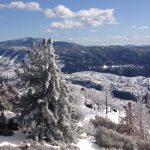A recent appeals court decision regarding Forest Service recreation fees has raised the specter that all fees, including the Southern California Adventure Pass, would be eliminated.
But the Forest Service says emphatically that is a false impression.
“The Forest Service is not considering the elimination of the Adventure Pass at this time,” wrote Larry Chambers, Forest Service media relations officer, in an email Wednesday, Feb. 29. “Visitors to national forests in California can still expect to pay the established recreation fees that are currently in place.”
Since early 2011, well before the federal 9th Circuit Appeals Court released its decision regarding the fees in the Coronado National Forest, the Forest Service had been reviewing its fee policy, said Jim Bedwell, national director for recreation, heritage and volunteer resources. Before a final decision will be made, the Forest Service will present its new proposals to its recreation advisory committees, composed of members of the public.
The appeals court did find that provision of roadside parking was insufficient to charge a recreation fee. Services must be used, not simply provided, the court opined in its decision to send the case back to the district court for further review. They did not ban all fees, but the criteria may be tougher.
Large areas are more likely to be adjusted than smaller and confined areas, Bedwell speculated. He also stressed that the Adventure Pass will continue to be needed for Southern California’s national forests.
The 2004 Recreation Enhancement Act, which authorized the Forest Service to establish the current fee structures, established these regional citizen committees to advise the agency of public reaction and comfort with the fees. Recreation fees for national forests are not a recent phenomenon. The Forest Service began collecting fees in 1965.
In a Jan. 18 letter to the Pacific Southwest Region, Bedwell recommended removing fee designations from many areas within the four Southern California forests.
But the Pacific Southwest Recreation Committee’s eight vacancies have only recently been filled and the committee is unlikely to meet before the fall, according to John Heil III, the Forest Service’s Pacific Southwest Region press officer. It last met in June 2010.
But whatever changes are made, the Adventure Pass is unlikely to be eliminated, Bedwell said. And its need at Humber Park will continue.
The Idyllwild facility is one of few in the San Bernardino National Forest to meet all six Forest Service criteria for charging a recreation fee.
In the past year, the Forest Service has collected about $60 million in recreation fees, which augment its maintenance program. More than 80 percent of fee collections remain at and are used in the forest where the money is collected. The fees are not aggregated nationally and reallocated.










